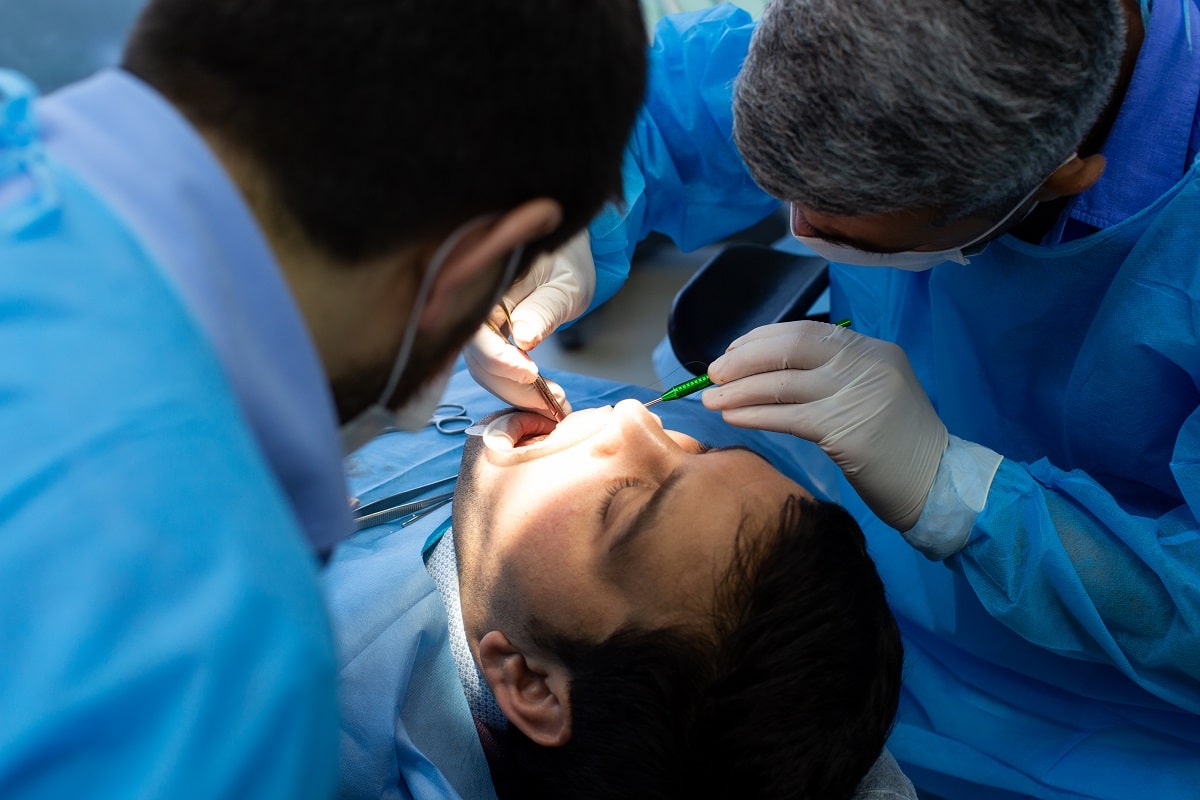Toothaches are bad enough, but what about the dental bill? Navigating tooth extraction costs in Australia can feel like a maze. Fear not, mate! This guide unravels the mystery, from simple procedures to wisdom teeth removal.
We’ll break down the cost spectrum, ranging from $75 to $3,000. The complexity of the extraction (think simple vs. surgical) is a major player, but there’s more to the story!
Here’s the good news: private health insurance with dental coverage can be a lifesaver, sometimes covering the entire cost. We’ll explore different insurance options.
We’ll get down to the nitty-gritty, explaining the difference between simple and surgical extractions. Wisdom teeth? We’ve got you covered there too.
Whether you’re facing a dental procedure or just want to be prepared, this guide equips you with the knowledge to navigate the pricing landscape of Aussie tooth extractions with confidence.
What Involves A Simple Tooth Extraction And How Much Does It Cost?
Procedure Overview
Simple tooth extractions are straightforward procedures that focus on removing teeth that are easily accessible and visible in the oral cavity. The process generally involves the following steps:
Evaluation
The dentist will begin by assessing the tooth that needs to be extracted. They will consider factors such as the tooth’s position, condition, and any potential complications.
Local Anaesthesia
To ensure a painless experience, the dentist will administer a local anaesthetic to numb the area around the tooth. This anaesthesia will cover the gum, jawbone, and the affected tooth, preventing any sensations of pain during the procedure.
Tooth Extraction
Once the anaesthesia takes effect, the dentist will use specialised instruments to gently loosen and remove the tooth from its socket. Patients may feel pressure during this step, but it should not be painful.
Post-extraction Care
After the tooth has been successfully removed, the dentist may provide guidance on post-extraction care, including instructions for managing any discomfort or swelling.
Healing
The healing process typically takes a few days to a few weeks, during which the patient should follow the dentist’s instructions to ensure proper recovery. This may involve taking prescribed pain medication and avoiding certain foods and activities.
Cost Considerations
The cost of a simple tooth extraction can vary depending on several factors:
Location
Dental costs can vary significantly based on your geographic location and the local cost of living. Urban areas tend to have higher dental fees than rural regions.
Dentist’s Experience
The level of experience and expertise of the dentist or oral surgeon performing the extraction can influence the cost. Specialists may charge more for their services.
Dental Insurance
If you have dental insurance, your policy may partially or fully cover the cost of a simple extraction. Be sure to check your insurance plan for coverage details and any applicable deductibles.
Tooth Location
The location of the tooth in your mouth can also affect the cost. Front teeth are often easier to extract than molars, and the complexity of the procedure may impact the price.
Additional Procedures
In some cases, additional procedures may be necessary, such as bone grafting or sutures. These can increase the overall cost of the extraction.
On average, the cost of a simple tooth extraction without insurance can range from $75 to $200 per tooth. However, it’s essential to consult with your dentist or oral surgeon for an accurate estimate based on your specific situation.
What Is The Price Of Surgical Tooth Extraction In Australia, And What Are The Procedures?
Surgical tooth extraction is a dental procedure performed by oral surgeons or specially trained dentists to remove a tooth that cannot be easily extracted through a simple or routine procedure. This process is typically used for impacted wisdom teeth, severely damaged or broken teeth, or teeth with complex root systems.
Here’s an overview of the surgical tooth extraction procedure:
Initial Assessment
The dentist or oral surgeon begins by conducting a thorough examination of the patient’s oral health. This may include taking dental X-rays to assess the tooth’s position and root structure.
Anaesthesia
Local anaesthesia is administered to numb the area around the tooth to ensure the patient’s comfort during the procedure. In some cases, conscious sedation or general anaesthesia may be used to relax the patient or for more complex extractions.
Incision and Flap Creation
The surgeon makes an incision in the gum tissue overlying the affected tooth. In cases of impacted wisdom teeth, the surgeon may also need to create a gum flap to access the tooth.
Bone Removal (if necessary)
If the tooth is partially or fully encased in bone, the surgeon may need to remove a portion of the bone using special dental instruments. This allows better access to the tooth.
Tooth Extraction
Once the tooth is fully accessible, the surgeon uses dental instruments to carefully loosen the tooth from its socket. In some cases, the tooth may need to be sectioned into smaller pieces for easier removal.
Cleaning and Irrigation
The extraction site is thoroughly cleaned, and any debris or infection is removed. Irrigation may be used to flush out the socket and ensure it is free from any remaining fragments.
Stitching the Incision
If a gum flap is created, the surgeon will carefully suture (stitch) the incision to promote proper healing. These sutures are typically absorbable and do not need to be removed.
Postoperative Care
The patient is given postoperative instructions, including guidelines for managing pain, swelling, and bleeding. Prescribed pain medications and antibiotics may be provided as needed.
Follow-Up Appointments
The patient is scheduled for one or more follow-up appointments to monitor the healing process and remove any sutures if necessary.
Recovery
Complete recovery can take several days to a few weeks, depending on the complexity of the extraction and the patient’s overall health. During this time, it’s important to follow the dentist’s or surgeon’s instructions for proper care to minimise the risk of complications.
Potential Complications
While surgical tooth extraction is generally safe, there can be complications such as infection, dry socket, or tooth nerve injury. Patients should contact their dentist or oral surgeon if they experience severe pain, persistent bleeding, or signs of infection.
It’s crucial to consult with a qualified dental professional for an accurate assessment of your specific case and to determine the most appropriate treatment plan, whether it involves surgical extraction or another dental procedure.

Cost Considerations For Surgical Tooth Extraction
When contemplating a surgical tooth extraction, it’s essential to be aware of the associated tooth extraction cost implications. This procedure typically involves a range of expenses that can vary based on several factors, including the complexity of the extraction, the location of the tooth, and the geographical region. Here, we’ll delve into key cost considerations associated with surgical tooth extraction:
Dental Insurance Coverage
One of the primary determinants of tooth extraction cost is whether you have dental insurance coverage. Dental insurance plans often cover a portion of the cost, with the patient responsible for the remaining expenses. It’s advisable to check your insurance policy’s terms and coverage limits to better understand your financial responsibility.
Type of Tooth
The location and type of tooth being extracted can influence the tooth extraction cost. Wisdom teeth, for example, are often more challenging to extract due to their positioning at the back of the mouth. This can result in a higher cost compared to extracting a front tooth.
Complexity of the Procedure
Surgical tooth extractions are categorised by their complexity. A straightforward extraction may involve minimal surgical intervention, while more complex cases may require bone removal, gum flap creation, or sectioning of the tooth. The greater the complexity, the higher the potential tooth extraction cost.
Anaesthesia and Sedation
The choice of anaesthesia or sedation can impact the tooth extraction cost. Local anaesthesia is typically less expensive than conscious sedation or general anaesthesia. However, the type of sedation used may be necessary for patient comfort and safety.
Oral Surgeon vs. Dentist
The tooth extraction cost may also vary depending on whether the procedure is performed by an oral surgeon or a general dentist. Oral surgeons generally have more extensive training in complex extractions, but their fees may be higher than those of a dentist.
Geographical Location
The cost of dental procedures can vary significantly by geographical region. Urban areas with a higher cost of living tend to have higher tooth extraction costs compared to rural areas.
Pre- and Postoperative Expenses
It’s essential to consider not only the cost of the actual extraction but also any pre-operative consultations, X-rays, medications, and postoperative follow-up visits. These additional expenses can contribute to the overall tooth extraction cost.
Emergency Extractions
In some cases, surgical tooth extractions are performed on an emergency basis, which may incur additional fees. Dental emergencies often necessitate immediate attention, which can affect the overall tooth extraction cost.
Payment Options and Financing
Many dental practices offer payment plans or financing options to help patients manage their tooth extraction costs. It’s advisable to inquire about these options in advance.
Unsure about Tooth Extraction Costs in Australia? Get Answers Here!
Is the tooth extraction cost higher for molars compared to front teeth?
Yes, typically, extracting molars, which are in the back of the mouth, can be more complex and, therefore, more expensive than extracting front teeth. The tooth extraction cost may vary depending on the tooth’s location.
Can I negotiate the tooth extraction cost with my dentist or oral surgeon?
It’s possible to discuss the tooth extraction cost with your dental provider and explore potential discounts or payment arrangements, especially if you have financial concerns.
What are the potential long-term consequences of postponing a necessary tooth extraction due to concerns about the cost?
Delaying a necessary tooth extraction due to cost concerns can lead to dental problems like infection, pain, and more extensive treatment needs in the future, potentially increasing the overall tooth extraction cost.
Are there any hidden fees associated with the tooth extraction cost, such as consultation fees or X-ray charges?
Besides the tooth extraction cost itself, it’s important to inquire about any additional fees that might be involved, such as consultation fees, X-ray costs, anaesthesia fees, or post-operative medication expenses.
Can I use a healthcare or concession card to reduce the tooth extraction cost in Australia?
Some individuals with specific healthcare or concession cards may be eligible for reduced or subsidized tooth extraction costs through government-funded dental programs. Check your eligibility and inquire about available discounts.
Do dental clinics provide cost estimates for tooth extractions before the procedure?
Most dental clinics are willing to provide cost estimates for tooth extractions during the initial consultation, allowing you to plan for the tooth extraction cost in advance.
What are the payment options available to manage the tooth extraction cost in Australia?
Various payment options are available, including payment plans, financing, and credit card payments, to help patients manage the tooth extraction cost-effectively and affordably.
Conclusion
At Parkmore Family Dental in Keysborough, Australia, we understand the concerns about tooth extraction costs. These can vary based on factors like procedural complexity, clinic location, and insurance coverage. It’s essential to be informed about these costs and explore ways to manage them.
Proactively researching dental insurance and financial options can help ensure that necessary dental care remains accessible. Neglecting oral health due to financial concerns can lead to more serious health issues.
Policymakers and healthcare providers must address the cost of dental care to improve accessibility. By focusing on preventive measures and early intervention, we can reduce the need for costly extractions.
At Parkmore Family Dental, we are committed to providing affordable and accessible dental care, prioritising the well-being of our community.




